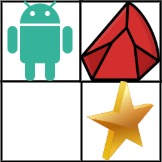2021-04-28 Daily-Challenge
Today I have done K-Similar Strings and leetcode's April LeetCoding Challenge with cpp.
K-Similar Strings
Description
Strings s1 and s2 are k-similar (for some non-negative integer k) if we can swap the positions of two letters in s1 exactly k times so that the resulting string equals s2.
Given two anagrams s1 and s2, return the smallest k for which s1 and s2 are k-similar.
Example 1:
Input: s1 = "ab", s2 = "ba"
Output: 1
Example 2:
Input: s1 = "abc", s2 = "bca"
Output: 2
Example 3:
Input: s1 = "abac", s2 = "baca"
Output: 2
Example 4:
Input: s1 = "aabc", s2 = "abca"
Output: 2
Constraints:
1 <= s1.length <= 20s2.length == s1.lengths1ands2contain only lowercase letters from the set{'a', 'b', 'c', 'd', 'e', 'f'}.s2is an anagram ofs1.
Solution
first I wrote a ugly code and failed...
class Solution {
int len;
vector<int> path;
vector<bool> ok;
int minLen;
bool findLoop(string &s1, string &s2, int loopLen) {
// cout << "?" << loopLen << endl;
for(int i = 0; i < len; ++i) {
if(ok[i]) continue;
// cout<< "%" << i << endl;
path.clear();
path.push_back(i);
findLoop(s1, s2, s2[i]);
int result;
for(int j = path.size() - 2; j >= 0; --j) {
if(s1[path[j]] == s2[path.back()]) {
result = path.size() - j;
}
}
// cout << i << ' ' << result << endl;
minLen = min(minLen, result);
// cout << 'r' << i << s1[i] << s2[i] << ' ' << result << ' ' << path.size() << endl;
if(result != loopLen) continue;
char begin = s2[path.back()];
while(s1[path.back()] != begin) {
// cout << '[' << path.back() << ", " << s1[path.back()] << ", " << s2[path.back()] << "] ";
ok[path.back()] = true;
path.pop_back();
}
// cout << '[' << path.back() << ", "<< s1[path.back()] << ", " << s2[path.back()] << "] ";
ok[path.back()] = true;
path.pop_back();
// cout << endl;
return true;
}
return false;
}
void findLoop(string &s1, string &s2, char end) {
// cout << '@' << end<< endl;
int pos = -1;
int next = -1;
int nextLoop;
for(int i = 0; i < len; ++i) {
if(ok[i]) continue;
if(s1[i] != end) continue;
for(int j = path.size() - 1; j >= max(pos, 0); --j) {
// cout << j << ' ' << path[j] << endl;
if(s2[i] == s1[path[j]]) {
if(j > pos) {
pos = j;
next = i;
}
}
}
nextLoop = i;
}
if(pos == -1) {
path.push_back(nextLoop);
findLoop(s1, s2, s2[nextLoop]);
} else {
path.push_back(next);
}
}
public:
int kSimilarity(string s1, string s2) {
// cout << s1 << ' ' << s2 << endl;
len = s1.length();
ok.resize(len);
for(int i = 0; i < len; i++) {
if(s1[i] == s2[i]) ok[i] = true;
}
int cnt = accumulate(ok.begin(), ok.end(), 0);
int answer = 0;
int cur = 2;
while(cnt < len) {
// cout << cnt << endl;
minLen = INT_MAX;
if(findLoop(s1, s2, cur)) {
cout << cur << endl;
answer += cur - 1;
cnt += cur;
} else {
cur = minLen;
}
}
return answer;
}
};
then rewrite using bfs:
class Solution {
int realKSimilarity(string s1, string s2) {
queue<string> q;
q.push(s1);
unordered_set<string> vis;
int count = -1;
while(q.size()) {
int sz = q.size();
count += 1;
while(sz--) {
string s = q.front();
q.pop();
if(s == s2) return count;
for(int i = count; i < s.length(); ++i) {
for(int j = i + 1; j < s.length(); ++j) {
swap(s[i], s[j]);
if(!vis.count(s) && s[count] == s2[count]) {
q.push(s);
vis.insert(s);
}
swap(s[i], s[j]);
}
}
}
}
return -1;
}
public:
int kSimilarity(string s1, string s2) {
if(s1 == s2) return 0;
string ns1, ns2;
for(int i = 0; i < s1.length(); ++i) {
if(s1[i] != s2[i]) {
ns1.push_back(s1[i]);
ns2.push_back(s2[i]);
}
}
return realKSimilarity(ns1, ns2);
}
};
// Accepted
// 57/57 cases passed (668 ms)
// Your runtime beats 12.62 % of cpp submissions
// Your memory usage beats 27.91 % of cpp submissions (61.3 MB)
April LeetCoding challenge 28
Description
Unique Paths II
A robot is located at the top-left corner of a m x n grid (marked 'Start' in the diagram below).
The robot can only move either down or right at any point in time. The robot is trying to reach the bottom-right corner of the grid (marked 'Finish' in the diagram below).
Now consider if some obstacles are added to the grids. How many unique paths would there be?
An obstacle and space is marked as 1 and 0 respectively in the grid.
Example 1:

Input: obstacleGrid = [[0,0,0],[0,1,0],[0,0,0]]
Output: 2
Explanation: There is one obstacle in the middle of the 3x3 grid above.
There are two ways to reach the bottom-right corner:
1. Right -> Right -> Down -> Down
2. Down -> Down -> Right -> Right
Example 2:

Input: obstacleGrid = [[0,1],[0,0]]
Output: 1
Constraints:
m == obstacleGrid.lengthn == obstacleGrid[i].length1 <= m, n <= 100obstacleGrid[i][j]is0or1.
Solution
basic dp, already done before
class Solution {
public:
int uniquePathsWithObstacles(vector<vector<int>>& obstacleGrid) {
int m = obstacleGrid.size(), n = obstacleGrid[0].size();
if(obstacleGrid[0][0] || obstacleGrid[m-1][n-1]) return 0;
vector<int> dp(m*n);
dp[0] = 1;
for(int i = 1; i < m*n; ++i) {
if(obstacleGrid[i/n][i%n] == 1) continue;
if(i >= n) dp[i] += dp[i-n];
if(i % n != 0) dp[i] += dp[i-1];
}
return dp.back();
}
};